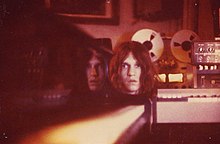
Tangerine Dream is a German electronic music band founded in 1967 by Edgar Froese. The group has seen many personnel changes over the years, with Froese the only constant member until his death in January 2015. The best-known lineup of the group was its mid-1970s trio of Froese, Christopher Franke, and Peter Baumann. In 1979, Johannes Schmoelling replaced Baumann until his own departure in 1985. This lineup was notable for composing many movie soundtracks. Since Froese's death in 2015, the group has been under the leadership of Thorsten Quaeschning. Quaeschning is Froese's chosen successor and is currently the longest-serving band member, having joined in 2005. Quaeschning is currently joined by violinist Hoshiko Yamane who joined in 2011 and Paul Frick who joined in 2020. Prior to this Quaeschning and Yamane performed with Ulrich Schnauss from 2014 to 2020. Schnauss only played two shows with Froese in November 2014 before Froese's passing.

The Mellotron is an electro-mechanical musical instrument developed in Birmingham, England, in 1963. It is played by pressing its keys, each of which causes a length of magnetic tape to contact a capstan, which pulls it across a playback head. As the key is released, the tape is retracted by a spring to its initial position. Different portions of the tape can be played to access different sounds.

Klaus Schulze was a German electronic music pioneer, composer and musician. He also used the alias Richard Wahnfried and was a member of the Krautrock bands Tangerine Dream, Ash Ra Tempel, and the Cosmic Jokers before launching a solo career consisting of more than 60 albums released across six decades.
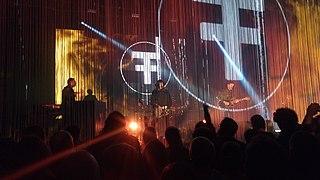
Archive are a musical group based in London, England, whose music spans electronic, trip hop, avant-garde, post-rock and progressive rock. Over their 28-year history, the band has released twelve studio albums and enjoyed established success throughout Europe.

Michael Shrieve is an American drummer, percussionist, and composer. He is best known as the drummer of the rock band Santana, playing on the band's first seven albums from 1969 to 1974. At age 20, Shrieve was the second youngest musician to perform at Woodstock. His drum solo during "Soul Sacrifice" in the Woodstock film has been described as "electrifying", although he considers his solo during the same piece in 1970 at Tanglewood the superior performance.

Electronic Meditation is the debut album by German electronic music group Tangerine Dream. It was released in June 1970 by record label Ohr.

Atomkraft are an English speed metal band from Newcastle, who were part of the new wave of British heavy metal movement. They formed in 1979, disbanded in 1988, and reformed in 2005. Atomkraft's "Total Metal" approach draws inspiration from fellow NWOBHM bands such as Motörhead and Venom, punk rock bands such as The Dickies, and early Exodus or Slayer. Lead vocalist/bassist Tony Dolan also fronted Venom for a number of years in the late 1980s and 90s.

Manuel Göttsching was a German musician and composer.

Cyclone is the eighth studio album by Tangerine Dream and the first in their canon to feature proper vocals and lyrics. The cover is a painting by band leader Edgar Froese.
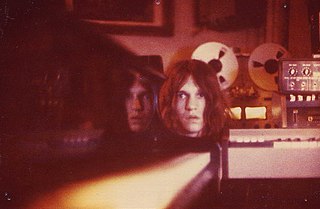
Earthstar is an electronic music group from Utica, New York. Earthstar was encouraged by Krautrock/Kosmische Musik/electronic music artist, composer, and producer Klaus Schulze to relocate to Germany where they contracted with Sky Records. Schulze inspired and produced their second album, French Skyline. Earthstar is notable as the only American band who participated in Germany's Kosmische Musik/electronic music scene while still at its height.
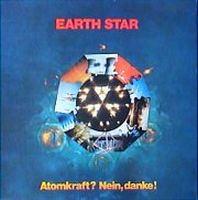
Atomkraft? Nein, Danke! is the third full-length album by the American electronic band Earthstar. It was their second release for the Hamburg, Germany-based Sky Records on February 1, 1981. Atomkraft? Nein, Danke! was recorded during 1979 and 1980 at Deponté la Rue Studio in Paris, France, and IC Studios and Emch Studio in West Germany. Additional tracks were recorded at Aura Sound Studio in New York. All tracks were written by Craig Wuest except "Golden Rendezvous", which was written by Wuest and Daniel Zongrone, and "Forest Floor, Part II: Aras", a tape-loop improvisation with guitarist Dennis Rea.

French Skyline is the second full-length album by the American electronic band Earthstar. It was their first release for Hamburg, Germany–based Sky Records.
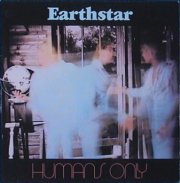
Humans Only is the fourth full-length album (1982) by the American electronic band Earthstar. It was their third and final release for Hamburg-based Sky Records.
Eruption was a short-lived German krautrock or experimental music super group founded by former Tangerine Dream member and then current Kluster member Conrad Schnitzler.
Dennis Rea is an American guitarist, author, and music event organizer. He was a member of the electronic music group Earthstar in the late 1970s and early 1980s. He leads the progressive rock quintet Moraine and worked with Jeff Greinke in Land. Other significant involvements have included Flame Tree, Identity Crisis, Iron Kim Style, Savant, Stackpole, Tempered Steel, and Zhongyu.
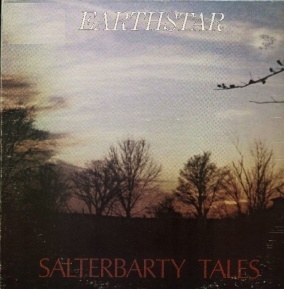
Salterbarty Tales is the debut album by the American electronic band Earthstar. It was recorded in 1977 and 1978 and released by Moontower Records in 1978. The album is the only release to feature significant grand piano sections performed by Craig Wuest with relatively basic synthesizer work and far less multitracking when compared to later Earthstar albums. It is also the only album not to feature tape loop instruments: the mellotron and the Birotron.
Norm Peach is an American bassist from Utica, New York who was a member of Earthstar during the late 1970s. He also played with Dennis Rea and Daniel Zongrone in Zuir prior to joining Earthstar. He appeared on two Earthstar albums: Salterbarty Tales (1978) and French Skyline (1979).

The use of electronic music technology in rock music coincided with the practical availability of electronic musical instruments and the genre's emergence as a distinct style. Rock music has been highly dependent on technological developments, particularly the invention and refinement of the synthesizer, the development of the MIDI digital format and computer technology.
Didier Bocquet is a French electronic music composer and musician who was active in the late 1970s and early 1980s. His primary instrument was the keyboard and he was inspired by German artist Klaus Schulze.
Software was a German electronic duo active from 1984 to 1999, originally composed of Michael Weisser and Peter Mergener. The duo formerly used the name Mergener & Weisser.
